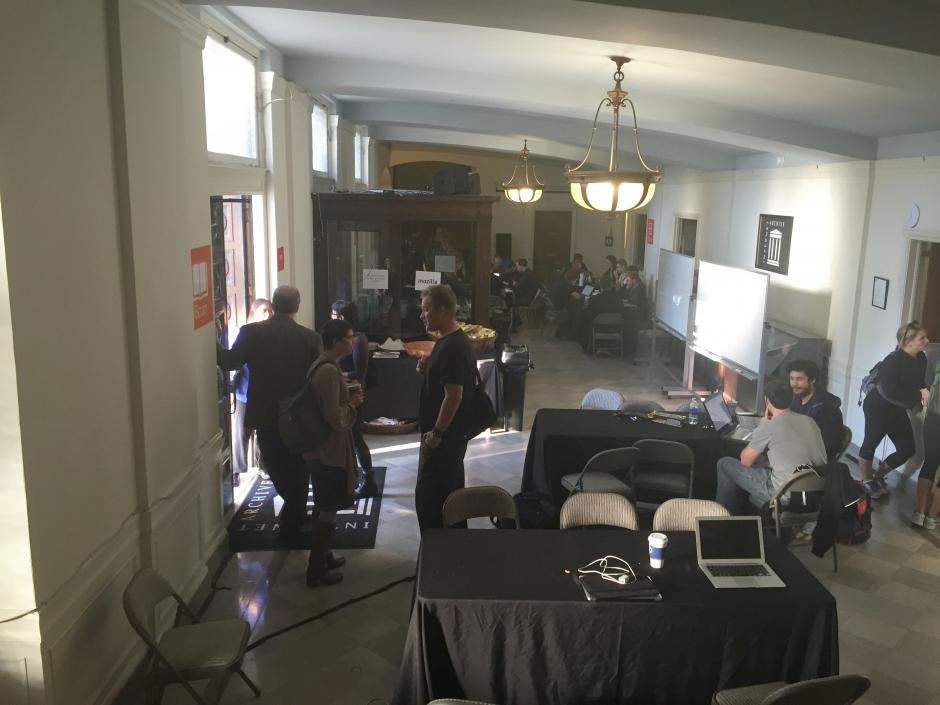Complete Transcription of the Friends of Aaron movie, including: Cory Doctorow, Brewster Kahle, Cindy Cohn and Virgil Griffith.
From the November 7, 2015 evening event at the Internet Archive, in San Francisco, before the speakers.
“Hi, I’m Cory Doctorow. Welcome to the third annual Aaron Swartz Day and International Hackathon.”
Now a Few Words from a Few Friends of Aaron’s
Cory Doctorow
Blogger, BoingBoing, Science Fiction Author, Little Brother/Homeland
Special Advisor, Electronic Frontier Foundation
You know. I knew Aaron for a really long time. And when we first met, people who cared about the Internet were a bit weird. It was as though we were really interested in something trivial and futuristic and speculative, while all around us raged really important battles about more significant issues. Issues about climate change. Issues about financial fairness. Issues about privacy. Issues about race and gender.
And what we’ve found in the years since then is that those other issues have gotten even more urgent, but more and more people have come to realize that the Internet is the fight that will determine how all those other fights go on. Because the Internet is the battlefield on which all those fights will be fought.
And so it’s really crucial that we win the Internet. Not because the Internet is more important than everything else, but because it’s the most foundational thing.
I hope you have a great day at the International Hackathon.
Brewster Kahle
Founder and Digital Librarian
Internet Archive
Aaron Swartz lives in many many ways. Aaron Swartz’ ideas have been carried forward by many others, and in fact, tragically, by his persecution, prosecution, and death, has come to be widely known to others.
The idea of public access to the public domain. That we can live open source lives freely, and that it’s desirable, and you meet new and interesting people.
And the lesson of Aaron Swartz has not been forgotten by the institutions that participated in having him crushed, and has led to reforms, top and bottom, of those organizations, to not have that ever happen again. So, public access, public domain, living open source lives, should be encouraged for the next generation, and made safe by the institutions that are too slowly learning their lessons.
Cindy Cohn
Executive Director
Electronic Frontier Foundation
Aaron has left us all such a legacy of caring about the politics around technology and not just caring, but getting involved. And whether you’re getting involved as a technologist or an activist you can have no better loadstar than Aaron. I have watched as he’s inspired people all over the world.
We haven’t had success in building things in DC, to help fix things. Aaron’s law has gotten stalled. However, we’ve been able to stop the bad. There have been several attempts, and there’s one right now, in the Cybersecurity to continue on the horrible pathway of making the Computer Fraud and Abuse Act worse and worse and worse. And, we stopped it cold, shortly after Aaron died. We’ve gotten it dramatically changed this time, and I think we’re gonna stop it cold again. So, while we haven’t yet been able to make good out of what happened to Aaron, we’ve been able to stop some bad. I’m not done yet. It’s still early days. But, I still run into people all the time who tell me that learning about Aaron was the moment. Their “wake up” moment. When they decided, “I care about technology too, and I want to get involved.” And that’s awesome!
Virgil Griffith
Technologist d’Avant-Garde
Tor2Web, WikiScanner
So after Aaron Swartz’ death, there was a rash of suicides at Cal Tech, where I was at school. (Unrelated!) And they had a little suicide thing. And I gave a little talk there, and I’ve been thinking about it recently. And I remember what I told them. I said “even when you feel like crap. You’re like ‘I can’t do anything.’ ‘I’m no good.’ ‘I spend like four days out of the week sleeping.’ ‘I’m only productive one day a week, tops.’ I would say, “even that one day a week, is more valuable than you would ever realize.”
I used Aaron as an explicit example. Even though Aaron was not even near (pauses). He was definitely not thriving. He was in surviving, not thriving mode. But still, even him in surviving mode was like amazing. You know. But I think he just couldn’t see it.
And I feel like Aaron was making this mistake as well. Okay so, Aaron would kind of flip between being egotistical and being very self deprecating. So, internally, he though of himself very highly, but outwardly he’d be very self deprecating. I felt like just in general, he did not appreciate, like, his own importance and the things he could do. Even if Aaron was active one day a week. Well that’s awesome. A one day a week Aaron, I’ll take it. I’ll totally take it. Ya know. And I think he would have really had difficulty, seeing that, as useful to the world. He’d be like “oh I’m so unproductive. I’m so ungood. Blah blah blah blah. No no no. One day a week’s great.
Brewster Kahle (ending comments):
Aaron Swartz has inspired hackathons, yearly gatherings of people remembering and moving forward some of the ideas of SecureDrop, of going and building public access to journal literature, to basically building a public sphere that may not be tied to institutions, certainly not tied to business plans, but tied to an inspiring vision, of information access and living open source lives. Aaron Swartz lives on in many many ways.

